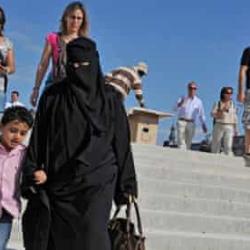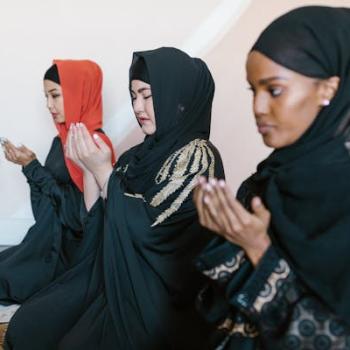 |
|
Good news for people who love bad news
|
Like establishment bobblehead Fareed Zakaria, I too have been compiling an annual list of Good News stories from the Muslim World for the past few years. In a year bracketed by terrible disasters in Iran and the Indian Ocean in which The Generous did indeed strike with the name Avenger – punctuated with man-made disasters in Iraq and Sudan’s Darfur – events forced us in 2004 to reflect on our human condition. Fortunately, there were many who elevated our spirit and did the right thing: speaking truth to power, working for peace & justice, and more. Muslims struggled hand-in-hand with non-Muslims for common causes (witness cooperation between Muslims and Hindus in India), creativity and openness among Muslim communities grew (Muslim humor? Don’t make me laugh!), and made progress towards stability in many of today’s Muslim-dominated hot spots. Tired of hearing so much bad news from around the Muslim world during this past year? Here are my Top Ten Muslim Good News Stories for 2004 (also see previous top ten lists for 2003 and 2002):
Despite the best efforts of foreign fighters and anti-Iraqi forces, Iraqis showed solidarity that rose above ethnic and religious divides. During the failed April siege of mostly Sunni Fallujah, Shias from across Iraq held food and blood drives for the people of the besieged city. Sunnis earlier supported Shia with blood drives after car bombs devastated Karbala and Baghdad Ashura commemorations. The majority of Iraqis support a unified Iraq, without special privileges for any ethnic or religious group. Most polls, even an opinion survey conducted by the US occupation authorities, confirmed that an overwhelming majority of Iraqis – both Sunni and Shia – want an end to the occupation, are unified against attacks on emerging Iraqi civil institutions, yet are opposed to former CIA agent and interim Iraqi prime minister Iyad Allawi.
2. India’s BJP party gets the boot
In a stunning upset, Indian voters gave a pink slip to the BJP and Hindutva, the extreme fundamentalism behind the bloody Gujarat pogrom of 2002. India voted in a former Italian nanny connected to the once-formidable Nehru-Gandhi dynasty and Congress Party. The big question: will Congress push a soft Hindutva or will it promote pluralism?
3. Yusuf Islam is chosen “Man for Peace”
We have to give Yusuf Islam props this year. And we’re not the only ones: the Gorbachev Foundation feted the former rock star with its “Man for Peace” award at the annual World Summit of Nobel Peace Laureates. Former Soviet President Mikhail Gorbachev praised Yusuf Islam for his courage as “a distinguished personage of culture and entertainment for peace messages, fraternity and integration between nations.” In recent years, Yusuf Islam has spearheaded multiple efforts in education, media, and charity: he is the Renaissance Man of Muslim activism. He has started schools in England, Mountain of Light (a record label), Small Kindness (a global charity), and IBERR (an education think tank). Students at IBERR-inspired schools in Anglophone Muslim communities around the world have excelled. People not giving props to Yusuf Islam this year included the United States Government’s Department of Homeland Security. In September, the US denied entry to Yusuf Islam “on national security grounds.” Meanwhile, the officials who had detained him did ask the 70’s star for his autograph.
We reported in last year’s Top Ten that Sudan was working toward a peace agreement. This year, Khartoum and the SPLA led by John Garang reached a deal at Naivasha, Kenya. The Sudan war has resulted in the deaths of more than 2 million people and has displaced over 4 million people since its start in 1983. Unfortunately, the tragic conflict in Darfur continues with tremendous loss of life. We hope Kofi Annan is right when he says that the accord inked in Naivasha could serve as a blueprint for resolving the Darfur crisis.
5. Turkish leader named “European of the Year”
And the winner is – Recep Tayyip Erdogan! Turkey’s prime minister took home the “European of the Year” title prize. Editors and readers of European Voice voted him the continent’s leading influence on the EU legislative and political agenda. Only five years ago, Erdogan was killing time in a prison cell, jailed for reciting Ziya Gokalp’s poem: “Minarets are our bayonets, domes are our helmets, mosques are our barracks, believers are our soldiers.” The courts had banned him from public office for life. Elections in 2003 swept his Justice & Development Party to power. Erdogan has since cleverly used the EU carrot to improve the human rights situation in Turkey and has, in effect, weakened the death-grip of the military.
6. Dead soldier’s dad finds no enemy
It’s not very often in the human experience that parents of dead soldiers raise money and aid for the “enemy.” But that’s just what one Mexican-American soldier’s dad has done.
Fernando Suarez de Solar, of Escondido, California, lost his only son Jesus when a cluster bomb shredded his body in Iraq. As the father of a slain American soldier, Suarez de Solar decided he wanted to see the place where his son perished. On a December 2003 trip to Iraq, he met many ordinary Iraqis and also visited injured children in hospitals. For the past year, Suarez de Solar has busied himself in an effort to take medical supplies to aid war victims in Fallujah and elsewhere in Iraq. Supported by Global Exchange and Code Pink, the effort involves a team of American parents who have lost sons in Iraq or September 11th. “You know,” Suarez del Solar remarks, “there are people who say I give aid and comfort to the enemy. I never spoke with Bush, he never sent me anything, but the people of Iraq I met, they comforted me for my loss! I have yet to see the enemy.”
7. Muslim and Hindu duo lead Bhopal’s struggle for justice
Can two Indian women factory-workers from Bhopal bring Dow Chemical, one of the world’s largest corporations, to account for the world’s worst industrial disaster? Ask Rashida Bee, 48, and Champa Devi Shukla, 52. The two women – one Muslim and the other Hindu – are leading an international movement to seek justice for the victims of Bhopal. Bee was an illiterate stay-at-home mom when she was thrust into the role of breadwinner in the wake of the 1984 disaster, in which 20,000 people died when gas from the local Union Carbide plant wafted over the city. She lost six of her relatives to cancer and her family’s men fell ill. As a factory worker, she co-founded (with Shukla) a successful independent labor union. Now, the dynamic duo has taken up the cause of Bhopal’s victims through their Jhadoo Maaro Dow Ko (“Beat Dow With a Broomstick”) campaign. “A woman’s life involves discarding relationships that she has known from infancy and adopting strangers as her own,” says Bee. “If she can face the world outside at such a fundamental level, then why should any other struggle for empowerment scare her?”
8. Allah made us funny and gave us Shakespeare
From the Department of Creative Jihad: Between the Allah Made Me Funny Tour to the Shakespeare & Islam Festival, dawah and outreach efforts took the creative form of stand-up comedy acts and a high-profile festival looking at the links between the British playwright and Islam. While Azhar Usman, Preacher Moss, and Azeem made us laugh at ourselves, the organizers of the ground-breaking Shakespeare & Islam festival held at London’s Globe Theatre transformed – with the Bard’s help – the discussion about Muslims living in the West.
Could a bashful 24 year-old Londoner of Azeri origin be the first global Muslim pop star sensation? Sami Yusuf’s album, Muallim, elevated and funked up traditional melodies with great production values that kept iPods from Kuala Lumpur to California buzzing. Finishing the year with a live performance at Toronto’s SkyDome, Sami Yusuf also charmed audiences in the UK, USA, and Malaysia. Allah Hu, Allah Hu, anyone?
10. Muslims celebrate 200 years of religious freedom
Ten years after the end of apartheid and white minority rule in South Africa, the country’s Muslims also celebrated another milestone: two centuries since the unbanning of Islam under colonial rule. An 1804 British decree led to the establishment of the first official Muslim house of worship, Masjid Awwal, and the legalization of Islamic education. Events across South Africa reflected on this legacy and what it means for Muslims living amidst South Africa’s vibrant stew of racial and religious pluralism today.
Mas’ood Cajee is a dentist and writer who lives in Northern California.













